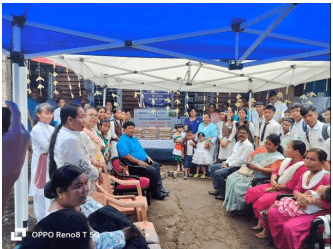Independence Day in Car Nicobar this year was marked not only by ceremonial functions but also by a community welfare initiative aimed at improving nutrition among children. The Department of Animal Husbandry and Veterinary Services (AH&VS), Andaman and Nicobar Administration, organised a table egg distribution drive on August 15, in collaboration with local authorities and community leaders. The initiative was conducted under the guidance of the Chief Secretary and the Secretary of AH&VS, reinforcing the administration’s focus on health and nutrition as part of public welfare.
A total of 1,125 eggs were distributed during the event. Of these, 700 eggs were provided to students of Classes 9 to 12 in secondary and senior secondary schools, while 425 eggs were given to Anganwadi children in Car Nicobar. The drive was designed to address nutritional gaps by supplying high-protein food to children, particularly in rural and tribal areas where dietary diversity can sometimes be limited.
The distribution took place during a function held as part of the 79th Independence Day celebrations. The Deputy Commissioner of Nicobars attended as chief guest, alongside the Secretary of the Tribal Council as guest of honour. Officials from various departments, including Education, Social Welfare, Fisheries, Agriculture, Krishi Vigyan Kendra, Forest, Child Development Project Office, and Block Development Office, also participated, highlighting inter-departmental coordination in implementing welfare initiatives.
The presence of schoolchildren and Anganwadi beneficiaries underscored the community focus of the programme. Around 45 schoolchildren and five Anganwadi children were present during the event, representing the primary beneficiaries of the scheme. Their involvement gave the programme a participatory character, with emphasis on inclusion and direct benefit.
The table egg distribution drive is part of a wider strategy by the AH&VS Department to promote child health and strengthen community nutrition. Eggs, being affordable and rich in protein and micronutrients, are seen as a practical dietary supplement to improve growth and development among children. The initiative reflects an approach where nutrition is linked directly to education and community welfare, aligning with broader national goals of reducing malnutrition.
The nutritional interventions are especially critical in island communities, where supply chain challenges often limit access to a variety of foods. By introducing locally manageable solutions such as egg distribution, the administration is attempting to provide sustainable and effective support to families.
By involving multiple departments, from education and health to agriculture and welfare, the programme aimed to deliver not just food but also awareness on nutrition and health practices. Such collaborative efforts are expected to amplify the impact of individual interventions, making them more sustainable in the long run.
By combining health awareness with targeted food distribution, the administration hopes to reduce malnutrition levels and improve health indicators among children in the Andaman and Nicobar Islands.
The egg distribution drive in Car Nicobar therefore stood out as more than just a symbolic gesture during Independence Day celebrations. It represented a conscious attempt to link national festivities with local welfare, turning the occasion into a platform for community benefit.
As the islands look to balance development with public welfare, such initiatives are likely to play an increasingly important role in ensuring that children, particularly in remote communities, are not left behind in nutritional and health outcomes. By aligning nutrition with education and involving the community at every stage, the Car Nicobar programme set an example of how symbolic events can be turned into opportunities for meaningful change.





